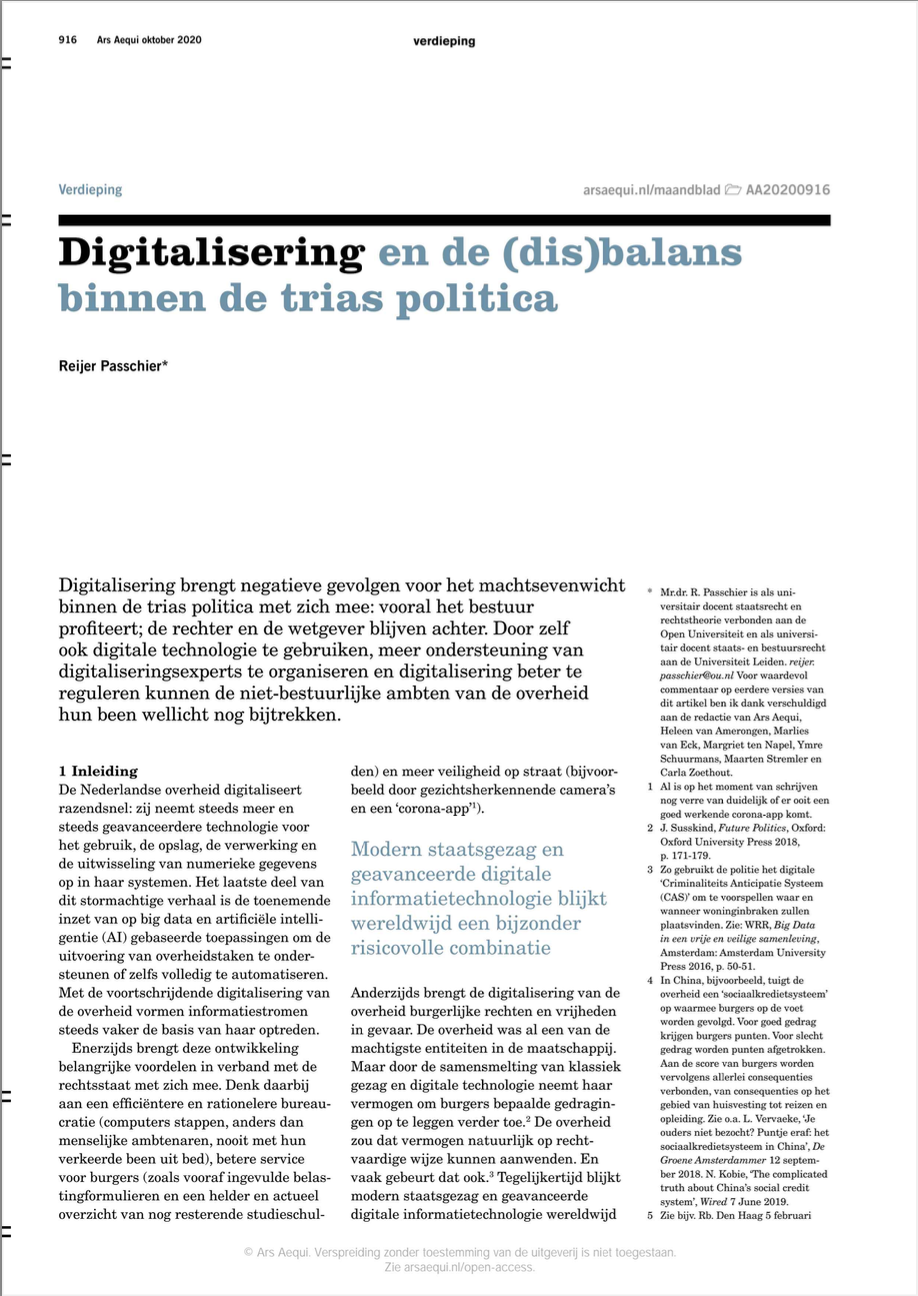The article can be found here.
Although many projects are going well, the Dutch state has a controversial reputation when it comes to use of algorithms for autonomous decision making and decision support. Through the lens of political theory and constitutional law this article argues that:
1. Executive state entities seized the fruits first of digitalization and algorithmic tools. Judicial powers and Parliament lag behind. For this reason, oversight on executive state entities is weakened, which amplifies the disbalance between state powers;
2. Due to the ‘black-box’ nature of some types of algorithms and a highly interconnective digital government, monitoring the legitimacy of algorithmic tools and corresponding output gets increasingly complicated;
3. Dutch state powers need recalibration now the digital era unfolds. The article suggests what kind of maintenance should be performed to keep constitutional checks and balances up to date.
In discussing the above topics, Reijer Passchier puts his finger on sore spots of the digital transformation the Dutch state is undergoing. As can be expected from an expert in constitutional law, the article is an analysis at the macro level. Abstract notions as the separation of powers, judicial voids and the iGovernment pass in review. Fortunately, complex juridical concepts are made accessible for non-legal readers through compelling examples and detailed elaborations. Though, in the technical domain, terms as ‘algorithms’, ‘digitalization’ and ‘technological development’ are used as umbrella terms, without specifications of the exact meaning in particular contexts. Debating the black-box nature of algorithms loses relevance if no distinction is made between directly interpretable models and post hoc explainable black-box models.
The article proposes three concrete scenarios for constitutional maintenance:
1. Passchier advocates digitalisation of supervisory state entities at a higher pace. Courts and Parliament should leverage the potential of digital technologies, such as natural language processing, by applying the technology on past jurisprudence and legislation;
2. Increasing sociotechnical awareness within supervisory bodies is needed. To realise this, auxiliary services for courts and Parliament should be upgraded. The article draws a comparison with the Office for Technology Assessment, as institutionalised in Germany (Büro für Technikfolgen-Abschätzung beim Deutschen Bundestag) and as proposed in the US.
3. Limits should be defined for technology. From a risk-averse point of view, it can be argued to ban some kinds of technology, like facial recognition and voting machines. However, Passchier advocates that resistance to new technologies (like Luddites) is not a sustainable stance for the long term. Should we consider public services like tax authorities to have significant more employees – if enough people can be found in the first place – to conduct work manually to reduce bias? No, algorithms can contribute to an efficient government when scrutinised sounds the argument. However, the article concludes that some restrictions to technological development are feasible. For example, judicial values, as the right to explanation and the duty of care need careful review in the context of algorithms used for autonomous decision making or decision support. The article suggests embedding the right to explanation for citizens as a legally binding requirement for executive state entities.
The question is whether the above measures are sufficient to guide the modern state through the digital transformation? The plea for more tech-savvy judges, legal professionals and members of Parliament contradicts the vague conceptualization of technical aspects of digitalization as described in this article. It is nevertheless a welcome starting point to debate the shape of the modern digital state from the perspective of political theory.

